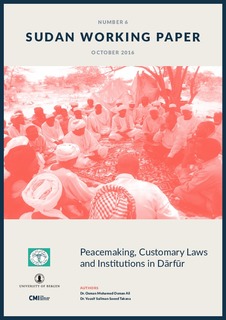| dc.contributor.author | Ali, Osman Mohamed Osman | |
| dc.contributor.author | Takana, Yousif Suliman Saeed | |
| dc.date.accessioned | 2018-01-04T08:21:19Z | |
| dc.date.available | 2018-01-04T08:21:19Z | |
| dc.date.issued | 2016-10-01 | |
| dc.identifier | oai:www.cmi.no:5966 | |
| dc.identifier.citation | Bergen: Chr. Michelsen Institute (Sudan Working Paper no. SWP 2016:6) 16 p. | |
| dc.identifier.isbn | 978-82-8062-610 | |
| dc.identifier.issn | 1890-5056 | |
| dc.identifier.uri | http://hdl.handle.net/11250/2475197 | |
| dc.description.abstract | The traditional native justice system in Darfur has an advantage over the modern state judicial one; it has proved its relevance for effectively managing and resolving conflicts, particularly in the rural communities, which involve the majority of the population in Darfur . It is also capable of providing a climate of peaceful coexistence and mutual consent, devoid of the feeling of injustice and resulting tendencies towards revenge. Recourse to the state courts in Darfur has been limited and confined to big towns/cities and mostly to breaches of governmental laws. There is also a rooted feeling in the various local communities of Darfur that the state judicial courts are foreign bodies. Based on these observations, many voice the importance of local factors in resolving the current Darfur conflict; i.e., the importance of local communities and traditional leaders being consulted. This article is a contribution to a thorough understanding of the workings of “the local,” focusing on peacemaking customary laws and institutions, with an evaluation of their usefulness in solving contemporary tribal and political conflicts in Darfur .
The present article goes over the usually uncodified or unwritten local customary laws ( c urf ){1} and the related institutions, developed to address disputes, enmities, and crimes at the grassroots levels in Darfur . The article tries to meet four objectives: (1) To understand how the different norm-related institutions currently operate in the local communities in Darfur ; (2) to dig deeply into the factors of continuity and change within the local norms and their institutions, especially during the past few decades; (3) to search for the type and nature of legitimacy of local norms and institutions; (4) to identify the level of efficiency of these norms and institutions in the peacemaking process in Darfur . The article is based on a field study, which implemented a qualitative research methodo | |
| dc.language.iso | eng | |
| dc.publisher | Chr. Michelsen Institute | |
| dc.relation | Sudan Working Paper | |
| dc.relation | SWP 2016:6 | |
| dc.relation.ispartof | Sudan Working Paper | |
| dc.relation.ispartofseries | Sudan Working Paper SWP 2016:6 | |
| dc.relation.uri | https://www.cmi.no/publications/5966-peacemaking-customary-laws-institutions-darfur | |
| dc.subject | Institutions | |
| dc.subject | Law | |
| dc.subject | Darfur | |
| dc.subject | Sudan | |
| dc.title | Peacemaking, Customary Laws and Institutions in Dārfūr | |
| dc.type | Working paper | |
